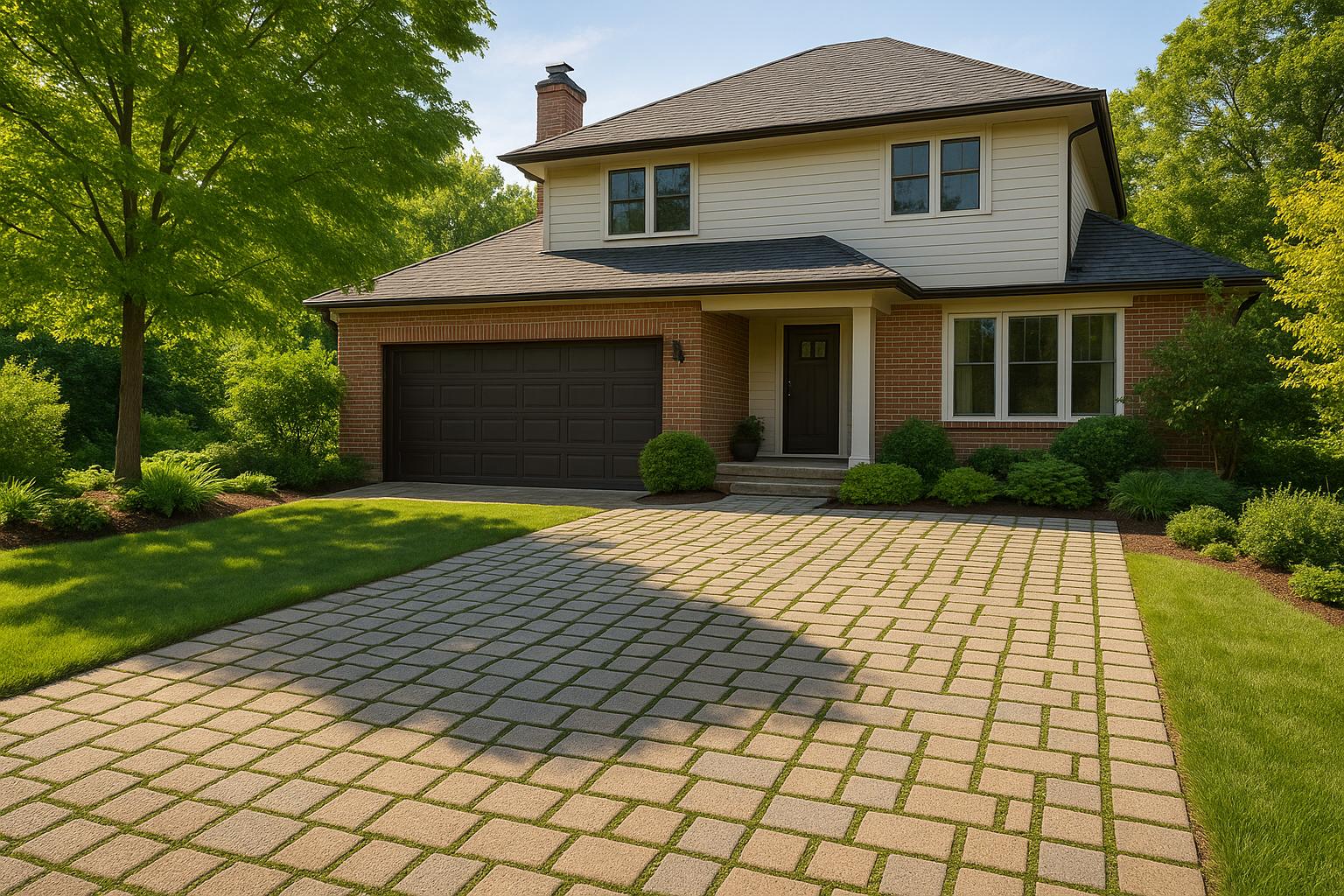- bhavya gada
- No Comments
Want better stormwater management for your Maryland home? Permeable pavers could be the solution. They help reduce flooding, filter rainwater, and recharge groundwater – all while being more durable for Maryland’s weather than traditional concrete or asphalt.
Key Benefits:
- Improved Water Management: Reduces runoff and prevents flooding.
- Eco-Friendly: Filters pollutants and replenishes groundwater.
- Long-Term Savings: Lower maintenance costs over time.
Quick Comparison: Permeable Pavers vs. Concrete/Asphalt
| Feature | Permeable Pavers | Concrete/Asphalt |
|---|---|---|
| Water Drainage | Excellent (filters water) | Poor (causes runoff) |
| Flood Risk | Lower | Higher |
| Heat Retention | Minimal | High |
| Maintenance Costs | Lower over time | Higher |
Next Steps: Plan your installation with professional help to ensure proper drainage and compliance with Maryland’s regulations.
How much do PERMEABLE pavers cost?
1. Permeable Paver Systems
Permeable paver systems blend attractive design with efficient water management, making them an ideal choice for Maryland’s climate. These systems use interlocking pavers with gaps that allow water to pass through, creating a natural drainage solution.
A typical system includes several key layers:
| Layer | Material | Purpose |
|---|---|---|
| Surface | Interlocking Pavers | Provides a sturdy, water-permeable top layer |
| Bedding | Crushed Stone (¼ inch) | Levels the surface and offers initial filtration |
| Base | Larger Aggregate (¾ inch) | Stores water and aids filtration |
| Sub-base | Coarse Stone (2–3 inch) | Supports deep water storage and gradual release |
When it rains, water flows through the gaps between pavers into the stone layers below. This setup not only filters out sediments and pollutants but also reduces surface runoff, which is critical during Maryland’s heavy rainfall events.
Benefits of Permeable Paver Systems
- Groundwater Recharge: Water naturally seeps into the soil, replenishing local aquifers.
- Pollutant Filtration: The layered design traps sediments and contaminants, improving water quality.
These systems help protect local ecosystems and offer long-term savings for homeowners by reducing the need for extensive drainage infrastructure.
For Maryland homeowners, professional installation is key to ensuring the system can handle heavy summer storms and withstand the freeze-thaw cycles of winter. Pro Landscapes MD provides expert guidance for those interested in sustainable hardscaping solutions.
With proper maintenance, permeable paver systems can last for decades, offering a practical and eco-friendly investment. Next, we’ll compare these systems to standard concrete and asphalt to explore their unique advantages and limitations.
2. Standard Concrete and Asphalt
Traditional concrete and asphalt are widely used for driveways and walkways in Maryland, but they pose specific water management challenges due to their non-porous nature. These materials create a solid surface that blocks water from seeping into the ground naturally.
Water Management Challenges
Non-permeable surfaces like concrete and asphalt contribute to several environmental issues:
| Impact | Consequence | Environmental Effect |
|---|---|---|
| Surface Runoff | Increased runoff | Higher flood risks |
| Water Quality | Pollutants in runoff | Potential contamination of local waterways |
| Ground Absorption | Limited infiltration | Reduced aquifer recharge |
| Heat Retention | Traps more heat | Worsens urban heat island effect |
In Maryland, where heavy summer storms are common, these surfaces often require additional drainage solutions. Without proper systems in place, runoff can cause property damage, soil erosion (especially in sloped areas), and harm nearby water ecosystems.
Managing Runoff
To handle runoff effectively, properties with concrete or asphalt often need extra drainage systems like French drains, berms, or swales. While these measures can help, they add complexity and increase long-term maintenance costs [1].
Heat and Temperature Concerns
Maryland’s hot summers exacerbate another issue with concrete and asphalt: heat retention. These materials absorb and hold heat, contributing to the urban heat island effect and driving up cooling costs for nearby homes and buildings.
These drawbacks make it clear why exploring alternatives, like permeable pavers, can be a smarter choice for managing water and temperature challenges.
sbb-itb-843f8be
Benefits and Drawbacks
When considering permeable pavers for Maryland properties, it’s important to weigh both the advantages and potential challenges.
Water Management and Drainage
Permeable pavers help manage rainwater effectively by filtering it back into the ground. This process helps recharge aquifers, reduces the risk of flooding, and captures pollutants along the way [1]. These features are especially useful in Maryland, where heavy rains and shifting weather patterns can strain local watersheds.
Cost vs. Long-Term Savings
While the initial installation cost may be higher, the benefits often outweigh the expense over time. Their ability to handle water drainage reduces the need for additional systems and minimizes the risk of water damage. This can lead to significant savings on maintenance and repairs, particularly in Maryland’s unpredictable weather conditions.
Maintenance and Durability
Though they do require occasional cleaning to clear debris, permeable pavers are well-suited for Maryland’s changing climate. Unlike traditional surfaces, they handle temperature fluctuations and heavy rainfall more effectively, offering a practical balance between upkeep and performance.
For Maryland property owners, Pro Landscapes MD provides expert installation to ensure these systems perform as intended. Whether for residential or commercial spaces, they can guide you through the process.
Next Steps
Now that we’ve covered the pros and cons, here’s how to move forward. Installing permeable pavers requires careful planning and expert execution to comply with Maryland’s regulations.
Professional Installation
Hiring professionals is crucial to ensuring your project meets local standards. Pro Landscapes MD specializes in paver installations and stormwater management, ensuring your system aligns with Maryland’s requirements.
Site Assessment
Before installation, it’s important to evaluate the site thoroughly. Key steps include:
- Understanding soil conditions and drainage patterns
- Reviewing grading requirements
- Planning for effective water management
- Estimating materials and costs accurately
Long-Term Maintenance Planning
Maintaining your paver system is essential for its longevity and performance. A maintenance schedule can help protect your investment. Pro Landscapes MD can assist in creating a tailored plan, including:
| Maintenance Task | Frequency | Purpose |
|---|---|---|
| Surface cleaning | Quarterly | Clears debris and prevents clogging |
| Joint material inspection | Bi-annually | Ensures proper drainage functionality |
| Annual inspection | Annually | Detects potential issues early |
"Proper drainage is essential to maintaining the health and stability of a landscape." – David, Pro Landscapes MD
These steps align perfectly with the benefits discussed earlier, helping you move forward with your sustainable hardscaping project. If you’re a Maryland homeowner looking to upgrade your property with eco-friendly hardscaping, Pro Landscapes MD offers free consultations. They’ll work with you to create a custom installation plan, combining beautiful designs with practical solutions for drainage and stormwater management.
FAQs
Are permeable pavers more expensive than traditional concrete or asphalt surfaces in Maryland?
Permeable pavers typically have a higher upfront cost compared to traditional concrete or asphalt surfaces. However, they offer significant long-term benefits, such as reduced stormwater runoff, improved drainage, and potential savings on water management costs. Over time, these advantages can offset the initial investment, especially in areas like Maryland that experience heavy rainfall and strict environmental regulations.
For Maryland homeowners looking to enhance their property while promoting sustainability, permeable pavers are an eco-friendly and cost-effective option when considering the bigger picture.
What maintenance is needed to keep permeable pavers effective and long-lasting?
To ensure the longevity and effectiveness of permeable pavers, regular maintenance is essential. Start by removing debris, leaves, and dirt from the surface to prevent clogging of the joints and pores. Sweeping or using a leaf blower works well for this. Periodic pressure washing can also help clear out any buildup in the paver gaps. If sediment accumulates, it may be necessary to replace or replenish the joint material with clean gravel. Additionally, inspect the pavers for any sinking or shifting and address these issues promptly to maintain proper drainage and stability. With consistent care, permeable pavers can remain functional and visually appealing for years to come.
How do permeable pavers benefit Maryland homeowners and the environment?
Permeable pavers provide significant benefits for both homeowners and the environment by allowing rainwater to seep through their surface, reducing stormwater runoff and helping to replenish groundwater. This is especially important in Maryland, where heavy rainfall can lead to flooding and erosion.
By managing water more effectively, permeable pavers also help prevent damage to nearby landscaping and reduce the strain on local drainage systems. Beyond water management, they are an eco-friendly choice that supports sustainable outdoor spaces while enhancing the functionality and beauty of your property.


















Chat with Us